| Srl | Item |
| 1 |
ID:
141968
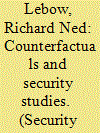

|
|
|
|
|
| Summary/Abstract |
Cause is a cognitive shorthand, not a feature of the world. Context is almost invariably critical in shaping outcomes. For both these reasons, correlations in international relations are weak and all but useless for purposes of explanation and prediction. I develop “inefficient causation” as an alternative approach to explanation and forecasting. It divides the causal problem into two components: reasons actors have for behaving as they do, and the aggregation of the behavior of multiple actors. Both make use of comparative and counterfactual analysis.
|
|
|
|
|
|
|
|
|
|
|
|
|
|
|
|
| 2 |
ID:
141967
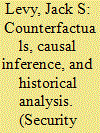

|
|
|
|
|
| Summary/Abstract |
I focus primarily on the utility of counterfactual analysis for helping to validate causal inferences in historical analysis. How can we use what did not happen but which easily could have happened to understand what did happen? With an infinite number of things that might have happened, and with temptations to construct “counterfactuals of convenience” to bolster one's preferred historical interpretations or political preferences, we need a set of rules or best practices for evaluating the scientific legitimacy of counterfactuals. Building on earlier work in several disciplines, I develop a set of criteria for the conduct of counterfactual analysis in historical case studies. The best counterfactuals begin with clearly specified plausible worlds involving small and easily imaginable changes from the real world. They make relatively short-term predictions based on empirically validated theoretical generalizations and on secondary counterfactuals that are mutually consistent. These counterfactuals are also sensitive to strategic behavior that might return history to its original course, and they are explicitly tested against competing counterfactuals.
|
|
|
|
|
|
|
|
|
|
|
|
|
|
|
|
| 3 |
ID:
141975
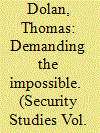

|
|
|
|
|
| Summary/Abstract |
This article shows that honor concerns can influence war initiation and termination decisions. When bargaining implicates status or commitments to in-group members, moral nationalists may experience dishonor—and with it emotions like shame and humiliation—when they have to make concessions. These honor costs are different from other costs because they can sometimes be vindicated through costly action. Including these costs in a basic, complete information bargaining model demonstrates that honor concerns can give rise to a “fight, then agree” equilibrium. These influences of honor on war initiation and termination are illustrated with case studies of British decisions in the 1982 Falklands War and French decisions during the 1940 invasion of France.
|
|
|
|
|
|
|
|
|
|
|
|
|
|
|
|
| 4 |
ID:
141970


|
|
|
|
|
| Summary/Abstract |
The idea of “least likely” (or “hard”) and “most likely” cases with which to test theories has been addressed in many prominent works on qualitative methodology. Such research designs are especially common among those working in the field of security studies. Nevertheless, there exists considerable confusion regarding how these cases should be defined and how authors can draw sound inferences from them. At worst, such confusion leads to the impression that researchers apply the labels of least and most likely cases in an arbitrary fashion. This article advances two related rationales for categorizing cases as least or most likely, describing the necessary steps researchers should follow to employ them correctly. It incorporates literature from security studies to demonstrate the pitfalls that researchers may be vulnerable to without a precise idea of how least and most likely cases should be used.
|
|
|
|
|
|
|
|
|
|
|
|
|
|
|
|
| 5 |
ID:
141974
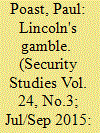

|
|
|
|
|
| Summary/Abstract |
Few studies consider how civil war onset can be influenced by third parties and by the belligerents’ perceptions of third party actions. I show that the American Civil War, a war largely ignored by civil war scholars, sheds insights into how anticipation of third party intervention influences the decision-making process within the target state and how the possibility of third party intervention can influence the onset and escalation of civil war. The American Civil War is an especially interesting case for exploring the role of third parties in civil war initiation since, unlike most cases considered by the existing civil war literature, the American Civil War is an instance of nonintervention: the third parties (the European powers in this case) mattered despite staying out of the conflict. Specifically, I argue that fear of foreign recognition (particularly by the British) played an underappreciated (if not the decisive) role in the earliest stages of the American Civil War by influencing Lincoln's decision to authorize the first major battle of the war at Manassas Junction, Virginia.
|
|
|
|
|
|
|
|
|
|
|
|
|
|
|
|
| 6 |
ID:
141966
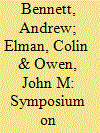

|
|
|
|
|
| Summary/Abstract |
The articles in this collection constitute the third of four symposia on qualitative and multi-method research in the study of national and international security. The symposia are the product of two workshops held in the fall of 2013, the first at the American Political Science Association annual meeting in Chicago and the second at the University of Virginia's Miller Center of Public Affairs. The conveners and participants are convinced that it would benefit scholars of security studies to be aware of some of the recent developments and debates among methodologists concerning qualitative and multi-method research. Each symposium comprises a longer essay with the author's view of the state-of-the-art on the topic at hand, and three shorter essays—typically one on specific applications to security studies, another on relevance to foreign policy making, and a final one featuring critical reflections.
|
|
|
|
|
|
|
|
|
|
|
|
|
|
|
|
| 7 |
ID:
141972


|
|
|
|
|
| Summary/Abstract |
Much of the literature on domestic politics and war assumes that open political debate, and especially the role of public opinion, is a key distinguishing feature of democracies in the international arena. Yet scholarship on political behavior demonstrates that the public is uninformed about foreign policy and tends to take cues from elites. This paper argues that the importance of elite cues gives democratic elites a crucial and often-overlooked role in democratic foreign policymaking. Four features of an elite audience—different preferences, concentrated power, informational advantages, and small coalition size—mean that the political logic of facing an elite audience is distinct from the public-driven logic of traditional models. These features give democratic leaders strategic incentives to bargain with, accommodate, or co-opt key elites, and to manage information flow among elites themselves. These elite political dynamics yield different insights than a voter-driven model and have significant implications for theories of democracies and war. This paper explores these dynamics in the Vietnam War, arguing that Lyndon Johnson's main domestic political task was to manage elites as he pursued escalation.
|
|
|
|
|
|
|
|
|
|
|
|
|
|
|
|
| 8 |
ID:
141969
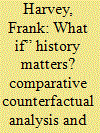

|
|
|
|
|
| Summary/Abstract |
Developing strong, policy-relevant causal explanations for major events in world politics often requires identification and rejection of weak counterfactual claims. Poorly constructed counterfactual arguments reveal serious deficiencies that undercut the necessary condition theories from which they are derived. Stronger explanations of historical events emerge when these weaknesses are weighed against the strengths of competing counterfactuals. Comparing the relative plausibility of competing (weak versus strong) counterfactual claims about the same event is the essence of comparative counterfactual analysis (CCA). When combined with process tracing, CCA can help to generate policy relevant findings by resolving many of the methodological pitfalls researchers confront when each method is applied in isolation.
|
|
|
|
|
|
|
|
|
|
|
|
|
|
|
|